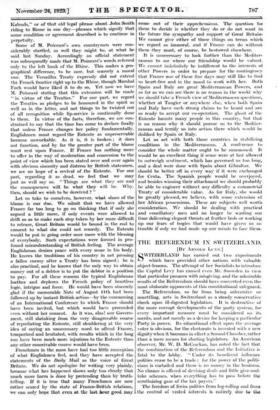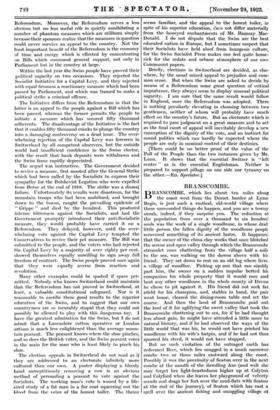THE REFERENDUM IN SWITZERLAND. [By ARNOLD LUN:!:.] S WITZERLAND has carried
out two experiments which have provided other nations with valuable object-lessons. The attempt of her Socialists to introduce the Capital Levy has caused even Mr. Snowden to view that particular panacea with misgiving, and the admirable results of the Referendum should have converted even the most obdurate opponents of this constitutional safeguard.
The Referendum, so far from being subversive or unsettling, acts. in Switzerland as a steady conservative check. upon ill-digested legislation. It is destructive of the more corrupt developments of the party system, for every important measure must be considered on its merits, and not merely as a device for keeping a particular Party in power. Its educational effect upon the average voter is-obvious, for the electorate is invested with a new dignity when it becomes in effect a Second Chamber, rather than a mere means for electing legislators. An American observer, Mr. W. a McCrackan, has noted the fact that the combination of the Referendum and the Initiative is fatal to the lobby. " Under its beneficent influence politics cease to- be a trade ; for the power of the politi- cians is curtailed and. there is no money in the business. No chance is offered of devising deals and little give-aod- take schemes, when everything has to pass before the scrutinizing gaze °Utile tax payers."
The freedom-of Swiss politics from log-rolling and from the control of vested interests. is entirely due to the Referendum. :Moreover, the Referendum serves _A less obvious but no less useful role in quietly annihilating a number of phantom measures which .are stillborn simply because their sponsors realize that the measures in question- could never survive an appeal to the country. Not the least important benefit of the Referendum is the economy of time and energy which is effected by concentrating on Bills which command general .support, not only in Parliament but in the country at large.
Within the last year the Swiss people have proved their political sagacity on two occasions. They rejected the Socialist Initiative for a Capital Levy, and they rejected with equal firmness a reactionary measure which had been passed by Parliament, and which was framed to make a political strike a criminal offence.
The Initiative differs from the Referendum in that the latter is an appeal to the people against a Bill which has been passed, whereas the former permits the people to initiate a measure which has secured -fifty thousand adherents. The disadvantage of the Initiative is the fact that it enables fifty thousand cranks to plunge the country into a damaging controversy on a dead issue. The over- . whelming rejection of the Capital Levy was foreseen in Switzerland by all competent observers, but the outside world had insufficient confidence in the Swiss elector, . with the result that bank deposits were withdrawn and the Swiss franc rapidly depreciated.
The sequel was instructive. The Government decided to revive a measure, first mooted after the General Strike which had been called by the Socialists to express their sympathy for the Bolshevist Legation who were expelled from Berne at the end of 1918. The strike was a dismal failure. Unfortunately its results were disastrous, for the mountain troops who had been mobilized, and brought down to the towns, caught the prevailing epidemic of " Grippe " and died by the hundred. This produced intense bitterness against the Socialists, and had the Government promptly introduced their anti-Socialistic measure, they would probably have carried it on a Referendum. They delayed, however, until the over- whelming vote against the Capital Levy tempted the Conservatives to revive their pet measure. The Bill was submitted to the people, and the voters who had rejected the Capital Levy by a majority of over eighty per cent. showed themselves eqUally unwilling to sign away full freedom of contract. The Swiss people proved once again that they were equally averse from reaction and revolution. • • Many other examples could be quoted if space per- mitted. Nobody who knows Switzerland could maintain that the Referendum has not proved in Switzerland, at least, a valuable constitutional safeguard. Nor is it reasonable to ascribe these good results to the superior education of the Swiss, and to suggest that our own countrymen are so incurably stupid that they could not possibly be allowed to play with this dangerous toy. I have the greatest admiration for the Swiss, but I do not admit that a Lancashire cotton operative or London artisan is much less enlightened than the average moun- tain peasant. The peasant knows where the shoe pinches, and so does the British voter, and the Swiss peasant votes in the main for the man who is least likely to pinch his shoe.
The election appeals in Switzerland do not read as if they are addressed to an electorate infinitely more cultured than our own. A poster displaying a bloody hand surreptitiously removing a cow is an obvious method of persuading a peasant to vote against the Socialists. The working man's vote is • wooed by a life- sized study of a fat man in a fur coat squeezing out the blOod froM the. veins of the honest toiler.' The theme seems familiar, and the appeal to the honest toiler, in spite of his superior education, e02S not differ materially from the honeyed enchantments of Mr. Ramsay Mac- Donald. I do not dispute that the Swiss are the best educated nation in Europe, but I sometimes suspect that their Socialists have held aloof from bourgeois culture, for the Swiss Socialist Press makes one feel quite home- sick for the sedate and urbane atmosphere of our own Communist papers.
Briefly, elections in Switzerland are decided, as else- where, by the usual mixed appeal to prejudice and com- mon sense. But when the Swiss are asked to decide by means of a Referendum some great question of critical importance, they always seem to display unusual political sagacity. I am sure that the same result would follow in England, once the Referendum was adopted. There is nothing peculiarly elevating in choosing between two gentlemen, neither of whom will probably have much effect on the country's future. But an electorate which is required to pass judgment on a great measure and to act as the final court of appeal will inevitably develop a new conception of the dignity of the vote, and an instinct for sound politics which can hardly be expected where the people are only in nominal control of their destinies.
[There could be no better proof of the value of the Poll of the People than the two instances given by Mr. Lunn. It shows that the essential Switzer is "left centre " as is the essential Englishman. Neither is prepared to support pillage on one side nor tyranny on the other.—En. Spectator.]



















































 Previous page
Previous page